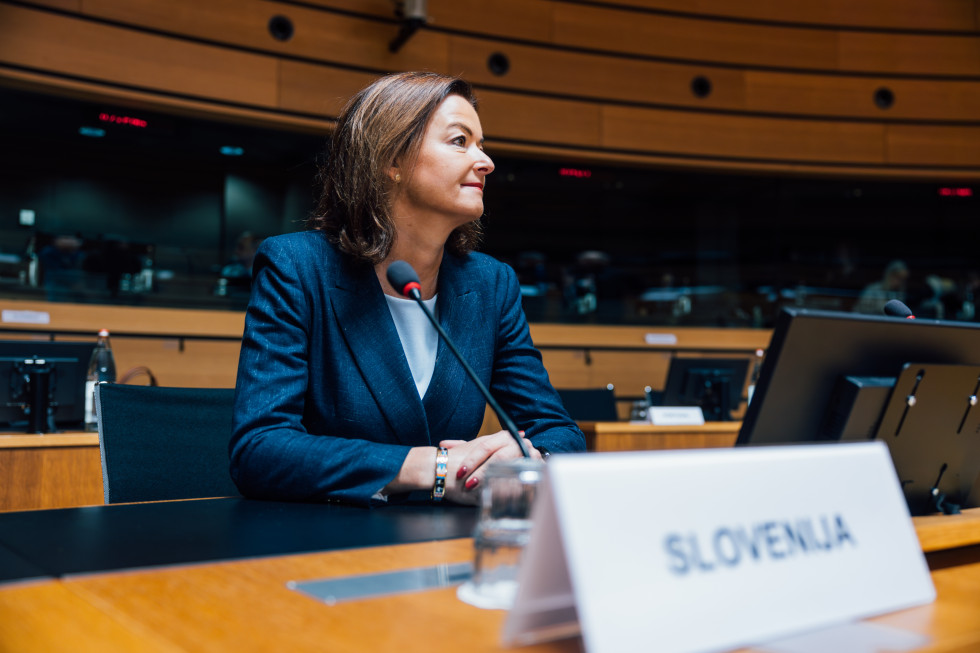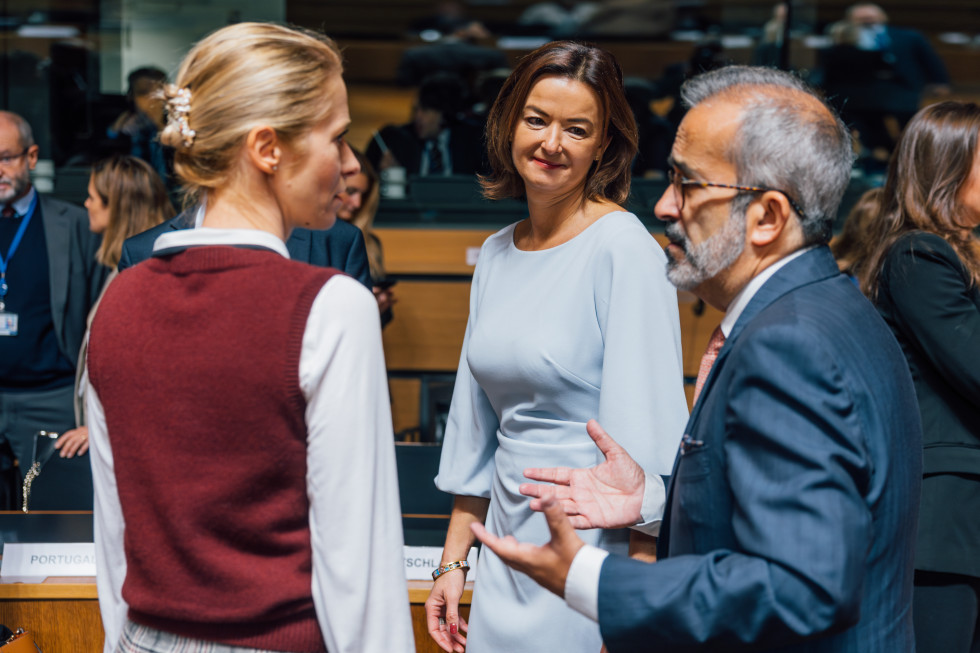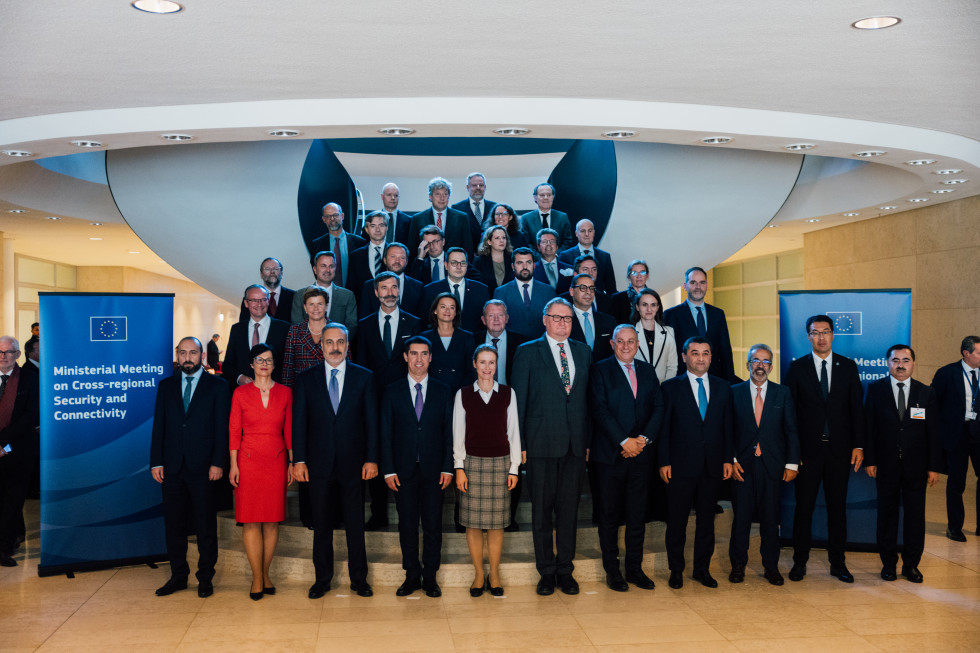Minister Fajon: The ceasefire in Gaza must be maintained and humanitarian access ensured

Minister Tanja Fajon at the EU Foreign Affairs Council meeting | Author Ministry of Foreign and European Affairs
The EU must play an active role in implementing the US plan for peace in Gaza
A large part of the discussion was devoted to the situation in the Middle East, with ministers focusing on the implementation of US President Trump's peace plan for Gaza, and the agreement between Israel and Hamas on the first phase of this plan. “Despite the ceasefire, the situation in Gaza remains fragile and uncertain. Our focus must now be on maintaining and monitoring the ceasefire. Slovenia supports the EU's active role in peace efforts," said Minister Fajon, adding: "In addition to the ceasefire, we need the immediate, unimpeded and safe delivery of humanitarian aid to the people of Gaza, in cooperation with UN agencies that play a leading role in this area. Gaza must be supplied with food, fuel, medical aid, shelter and other emergency assistance. Israel must urgently open more crossings and allow the evacuation of the wounded. Journalists must also be guaranteed safe and unhindered access to Gaza so that they can carry out their work freely and independently.”
During the debate, Minister Fajon pointed out that the ultimate goal of the peace process must be the implementation of the two-state solution, as set out in the New York Declaration. It is therefore essential to continue strengthening the Palestinian Authority, and that it must be involved in the reconstruction and future governance of Gaza. She also raised concerns about discussions in Israel regarding the annexation of the West Bank, stating that they are deeply worrying and threaten the two-state solution. She also emphasised Slovenia's readiness to assist in the reconstruction of Gaza, drawing on its experience following the wars after the dissolution of the Socialist Federal Republic of Yugoslavia, as well as its expertise in the field of demining.
Russian aggression against Ukraine must end
In her speech, Minister Fajon emphasised that the EU must continue to support Ukraine in all areas: "The EU must maintain pressure on Russia, including through sanctions, to force it to end the war, agree to an unconditional ceasefire and begin serious peace negotiations. Slovenia supports all efforts to create conditions for a ceasefire in Ukraine. In this regard, Minister Fajon said: "We hope that the announced meeting between Trump and Putin in Budapest will bear fruit and represent a step towards the long-awaited peace. It is essential that Ukraine be included in all peace talks."
She went on to stress the urgent need for the immediate and safe return of deported Ukrainian children, as well as for the release of detained civilians and journalists. Announcing her upcoming visit to Ukraine, she also revealed the launch of Slovenian humanitarian projects related to the welfare of children and called for the acceleration of Ukraine's EU accession process. "We must reward Ukraine's commitment to European values and its progress in reforms."
She also expressed support for the establishment of the Special Tribunal for the Crime of Aggression against Ukraine, which Slovenia intends to join: "This tribunal is essential to ensure accountability for crimes and prevent their recurrence in the future."
Ukrainian Foreign Minister Andrii Sybiha also participated at the start of the discussion, presenting the current situation on the ground.
Slovenia supports strengthening EU relations with the Indo-Pacific
Ministers adopted conclusions on implementing the European Union Strategy for Cooperation in the Indo-Pacific. Slovenia recognises the importance of strengthening the EU's presence and visibility in the region. This is one of the reasons why Slovenia has opened embassies in Seoul and Manila. The country also intends to join the Treaty of Amity and Cooperation in Southeast Asia.
In addition to trade and maritime security, a partnership with the Indo-Pacific region must be founded on respect for human rights. Prosperity depends not only on economic growth, but also on protecting fundamental freedoms.
Sudan was also one of the topics in focus
During the rest of the meeting, ministers discussed the situation in Sudan, as well as in Moldova and Georgia, and focused on the relations between the EU and the countries of Latin America and the Caribbean. Regarding Sudan, Minister Fajon drew attention to the severity of the situation and the suffering experienced by the population. "We must strive to end the fighting, provide humanitarian aid and protect civilians. Although the Council's conclusions provide us with strong political direction and a clear framework for action, it is time to translate this direction into concrete steps on the ground," the Minister emphasised.
At the meeting, ministers also adopted conclusions on Sudan, the new strategic EU-India agenda and the EU-UN Joint Priorities on Peace and Security for 2025–2028.
Prior to the meeting, Minister Fajon attended an informal breakfast meeting of EU foreign ministers, during which the focus was on enhancing the operational efficiency of the EU Foreign Affairs Council. Minister Fajon advocated measures to strengthen the effectiveness of the EU's external action, particularly in terms of decision-making and responding to developments in the international community.
Ministerial Meeting on Cross-Regional Security and Connectivity
Minister Fajon will also participate in a ministerial meeting with the countries from the Eastern Partnership, the Black Sea region and Central Asia, focusing on interregional security and connectivity. In the first part of the meeting, which will be devoted to security, stability and resilience in the Black Sea region, the Minister will highlight the numerous opportunities for strengthening cooperation between the EU and the countries in the region, including in combating hybrid threats and cyber-attacks, ensuring maritime security, clearing landmines and increasing the region's resilience to the effects of climate change.
The second part of the meeting will focus on interregional connectivity and new approaches to joint action in areas such as connectivity, trade, transport, energy and digitalisation. Slovenia will be represented by State Secretary Neva Grašič.

Minister Tanja Fajon at the EU Foreign Affairs Council meeting | Author Ministry of Foreign and European Affairs

Minister Tanja Fajon participates in the ministerial meeting with countries from the Eastern Partnership, the Black Sea region and Central Asia | Author Ministry of Foreign and European Affairs

